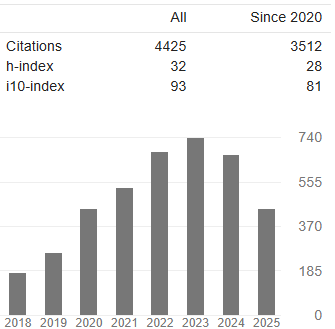RISK FACTORS IN PULMONARY TUBERCULOSIS TREATMENT FAILURE
Downloads
Pulmonary tuberculosis (TB) is a global health problem and has become the leading cause of death. Tuberculosis eradication is inhibited due to the tendency of patients to not complete the TB treatment. The purpose of this study was to determine the relationship between knowledge, nutritional status, oral medication adherence, and family support as risk factors for pulmonary tuberculosis treatment failure. The design of this study is that of case-control, and this study involved samples of pulmonary TB patients who were declared not cured after treatment (14 people), and control samples of pulmonary TB patients who were declared cured (28 people). The data were obtained through measurements of nutritional status and interviews, while treatment failure was based on data from the TB 01 form. Data was analysed using univariable and bivariable analyses, and the magnitude of risk factors was based on the odds ratio (OR) and 95% confidence interval (CI). The results showed that the factors associated with failure of pulmonary TB treatment are knowledge (p = 0.022; OR = 6.6; 95% CI = 1.48 - 29.36), nutritional status (p = 0.005; OR = 9.16; 95% CI = 2.11 - 39.85), and medication adherence (p = 0.003; OR =11.0; 95% CI = 2.37 - 54.14), whereas the unrelated factor is family support (p = 0.47). It is recommended to provide counselling, nutritional guidance, medication assistance, and family support to patients during the treatment period for pulmonary tuberculosis.
Keywords:treatment failure, knowledge, nutritional status, compliance
Baratawidjaja, K. and Rengganis, I. (2014) Imunologi Dasar. 12th edn. Jakarta: Balai Penerbit Fakultas Kedokteran Universitas Indonesia.
Crofton (2002) Tuberkulosis Klinis. Jakarta: PT. Widya Medika.
Danusantoso, H. (2013) Buku Saku Ilmu Penyakit Paru. Kedua. Jakarta: EGC press penerbit Kedokteran.
Dean, A., Cox, H. and Zignol, M. (2017) ‘Epidemiology of Drug-Resistant Tuberculosis', Advances in experimental medicine and biology, 1019, pp. 209–220. https://doi.org/10.1007/978-3-319-64371-7_11
Dooley, K. E. et al. (2011) ‘Risk factors for tuberculosis treatment failure , default , or relapse and outcomes of retreatment in Morocco', BMC Public Health. BioMed Central Ltd, 11(1), p. 140. https://doi.org/10.1186/1471-2458-11-140
Dooley, K. E. and Chaisson, R. E. (2009) ‘Tuberculosis and diabetes mellitus: convergence of two epidemics', The Lancet infectious diseases. NIH Public Access, 9(12), p. 737. https://doi.org/10.1016/S1473-3099(09)70282-8
Endarti, A. T. et al. (2018) ‘Situasi Tuberkulosis di Empat Kabupaten / Kota di Pulau Sumatera dan Banten Tuberculosis Situation in Four Districts in Sumatera Island and Banten', pp. 108–118.
Fadila, R. N. and Riono, P. (2014) ‘Pengaruh Rejimen terhadap Ketidakpatuhan Berobat Tuberkulosis', Jurnal Kesehatan Masyarakat Nasional, 9, pp. 107–112.
Friedman (2003) Keperawatan Keluarga, Teori dan Praktik. Jakarta: Penerbit Buku Kedokteran EGC.
Garner, P., Smith, H. and Volmink, J. (2007) ‘Perspectives Promoting adherence to tuberculosis treatment', 035568(December 2006), pp. 2006–2008. https://doi.org/10.2471/BLT.
Glaziou, P., Floyd, K. and Raviglione, M. C. (2018) ‘Global Epidemiology of Tuberculosis'.
Gupta, K. buhari and Vishvkarma, S. (2009) ‘Tuberculosis and nutrition', Lung India, 26(1), pp. 9–16.
Indonesian Ministry of Health (2011) Pedoman Nasional penanggulangan tuberrculosis. Edisi 2. Jakarta.
Indonesian Ministry of Health (2018) Infodatin Pusat Data dan Informasi Kementrerian Kesehatan RI. Jakarta.
Kaulagekar-nagarkar, A., Dhake, D. and Jha, P. (2012) ‘Perspective of tuberculosis patient on family support and care in rural Maharashtra', 411007, pp. 224–230.
Mulenga, C. et al. (2010) ‘Management of pulmonary tuberculosis patients in an urban setting in Zambia : a patient ' s perspective', BMC Public Health. BioMed Central Ltd, 10(1), p. 756. https://doi.org/10.1186/1471-2458-10-756
Muniroh, S., Aisah, S. and Mifbakhuddin (2013) ‘Faktor-faktor yang berhubungan dengan Kesembuhan Penyakit Tuberculosis (TBC) Paru di Wilayah Kerja Puskesmas Mangkang Semarang Barat', Jurnal Keperawatan Komunitas, 1(1), pp. 33–42.
Murtantiningsih and Wahyono, B. (2010) ‘Faktor-faktor yang berhubungan dengan kesembuhan penderita tuberkulosis paru', Jurnal Kesehatan Masyarakat, 6(1), pp. 44–50. https://doi.org/10.15294/kemas.v6i1.1751
Nawas, A. (2010) ‘Penatalaksanaan TB MDR Dan Strategi DOTS Plus', Jurnal Tuberkulosis Indonesia, 7(10–17).
Ndwiga, J. muriuki, Kikuvi, G. and Omolo, jared odhiambo (2016) ‘Factors influencing knowledge on completion of treatment among TB patients under directly observed treatment strategy, in selected health facilities in Embu County, Kenya', 8688, pp. 1–8. https://doi.org/10.11604/pamj.2016.25.234.8761
Niven (2002) An Introduction for nurses and other health care Professionals. alih Bahas. Jakarta: Penerbit Buku Kedokteran EGC.
Notoatmodjo, S. (2012) Promosi Kesehatan dan Perilaku Kesehatan. Jakarta: Rineka Cipta.
Nugrahaeni, D. K. and Malik, U. S. (2015) ‘Analisis Penyebab Resistensi Obat Anti Tuberkulosis', Jurnal Kesehatan Masyarakat, 11(1), pp. 8-15. https://dx.doi.org/10.15294/kemas.v11i1.3341
Septia, A., et al. (2013) ‘Hubungan dukungan keluarga dengan kepatuhan minum obat pada penderita tb paru', pp. 1–10.
Verma, M. et al. (2019) ‘Making the case : developing innovative adherence solutions for the treatment of
tuberculosis', pp. 1–4. doi: 10.1136/bmjgh-2018-001323.
West Java Provincial Health Office (2017) Profil Kesehatan Jawa Barat. Bandung.
WHO (2016) Global Tuberculosis Report 2015. Geneva.
WHO (2018) Tuberculosis profile. Geneva.
Van Crevel, R., Ottenhoff, T. H. M. and van der Meer, J. W. M. (2002) ‘Innate immunity to Mycobacterium tuberculosis.', Clinical microbiology reviews, 15(2), pp. 294–309. https://doi.org/10.1128/CMR.15.2.294
Workneh, M. H., Bjune, G. A. and Yimer, S. A. (2017) ‘Prevalence and associated factors of tuberculosis and diabetes mellitus comorbidity : A systematic review', pp. 1–25.
Wulandari, D. H. (2015) ‘Analisis Faktor-Faktor yang Berhubungan dengan Kepatuhan Pasien Tuberkulosis Paru Tahap Lanjutan Untuk Minum Obat di RS Rumah Sehat Terpadu Tahun 2015', 2, pp. 17–28.
- The authors agree to transfer the transfer copyright of the article to The Indonesian Journal of Public Health effective if and when the paper is accepted for publication.
- Authors and other parties are bound to the Creative Commons Attribution-NonCommercial-ShareAlike 4.0 International License for the published articles, legal formal aspect of journal publication accessibility refers to Creative Commons Attribution-NonCommercial-ShareAlike 4.0 International License (CC BY-NC-SA), implies that:
- Attribution ” You must give appropriate credit, provide a link to the license, and indicate if changes were made. You may do so in any reasonable manner, but not in any way that suggests the licensor endorses you or your use.
- NonCommercial ” You may not use the material for commercial purposes.
- ShareAlike ” If you remix, transform, or build upon the material, you must distribute your contributions under the same license as the original.































